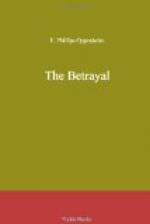And then I stood as though suddenly turned to stone. Before me were the great front windows of the castle. Beyond, eastwards, stretched the salt marshes, the salt marshes riven with creeks. Once more my unwilling hands touched that huddled-up heap of extinct humanity. I saw the dead white face, which the sun could never warm again, and I felt the hands, cold, clammy, horrible. Ray was a soldier, and life and death had become phrases to him; but I—it was the first dead man I had ever seen, and the horror of it was cold in my blood. Ray had murdered him, fought with him, perhaps, but killed him. What would she say if she knew? Would his hands be clean to her, or would the horror rise up like a red wall between them?
“Will you take coffee, sir?”
I set my teeth and turned slowly round. I even took the cup from the tray without spilling it.
“What liqueur may I bring you, sir?” the man asked.
“Brandy,” I answered.
In a few minutes I was laughing at myself, not quite naturally, perhaps, but only I could know that. I was getting to be a morbid, nervous person. It was the solitude! I must get away from it all before long. Fate had been playing strange tricks with me. Life, which a few months ago had been a cold and barren thing, was suddenly pressed to my lips, a fantastic, intoxicating mixture. I had drawn enough poison into my veins. I would have no more. I swore it.
* * * * *
I tried to leave the castle unnoticed, but the place was alive with servants. One of them hurried up to me as I tried to reach my hat and coat.
“Her ladyship desired me to say that she was in the billiard-room, sir,” he announced.
“Will you tell Lady Angela—” and then I stopped. The door of the billiard-room was open, and Lady Angela stood there, the outline of her figure sharply de fined against a flood of light. She had a cue in her hand, and she looked across at me.




